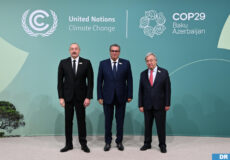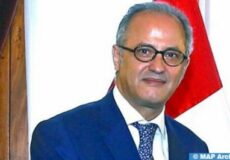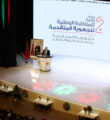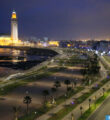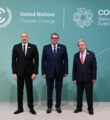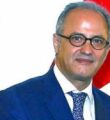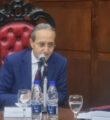Ouarzazate’s Noor Solar Plant Supplies Nearly 2 Mln Moroccans with Electricity, Minister Says
Rabat – The Noor Ouarzazate solar power plant supplies nearly two million Moroccans with electricity and prevents the emission of nearly one million ton of greenhouse gas per year, Minister of Energy, Mines and Environment, Aziz Rabbah, said on Tuesday.
Speaking at the 5th session of the United Nations Environment Assembly (UNEA), held remotely, Rabbah noted that the Noor Ouarzazate mega-solar power plant (580 MW), one of the largest in the world, enables to supply nearly two million Moroccans with electricity and prevents the emission of nearly one million ton of greenhouse gases per year, adding that “Noor Midelt”, which is a more ambitious solar project, has just been launched with an impressive capacity of 1,600 MW.
In this regard, the official highlighted the Kingdom’s commitment to the environment and sustainable development, recalling its attachment to all multilateral environmental agreements and its strong desire to include them in its policies and social and economic development programs.
“This political commitment, driven at the very high level of the State by HM King Mohammed VI, materialized with the adoption of the National Sustainable Development Strategy (SNDD) in June 2017, as a unifying framework for the sectoral development programmes, aimed at ensuring Morocco’s transition to a green and inclusive economy by 2030 “, he said, highlighting the creation by decree of the” National Commission for Sustainable Development”, under the chairmanship of the Head of Government.
“Currently, this strategy is operationalized through the implementation of 28 Sectoral Sustainable Development Action Plans (PADD) and a Pact for exemplary administration, encouraging public administration to lead and adopt the principles of sustainable development that it recommends to the entire population,” he said.
At the territorial level, partnership agreements have been signed with the regions of the Kingdom, with the aim of translating the strategic orientations of the SNDD into regional development plans, the minister pointed out.
“The implementation of these action plans has enabled our country to make remarkable progress in mainstreaming sustainability into key development sectors,” he said.
In this regard, Morocco, given the central role played by the energy sector in achieving its sustainability objectives, particularly in the context of the post-COVID 19 recovery, has adopted a national energy policy aimed valorizing its renewable energy resources and strengthening energy efficiency and regional integration, noted the minister, adding that thanks to a strong royal impetus, this strategy has defined ambitious objectives in terms of development of renewable energies, with a view to increasing their share of installed electricity capacity to 52% by 2030.
Currently, nearly 4,000 MW of energy from renewable sources is already operational (750 MW solar, 1,430 MW wind, and 1,770 MW hydro), or more than 37% of the total installed capacity, he concluded.
The United Nations Environment Assembly is the world’s highest-level decision-making body on the environment, with a universal membership of all 193 Member States. The Assembly meets biennially in Nairobi, Kenya, to set priorities for global environmental policies and develop international environmental law.
The fifth session of the UN Environment Assembly (UNEA-5) provides leadership, catalyzes, intergovernmental actions on the environment, and contributes to the implementation of the UN 2030 Agenda for Sustainable Development and its Sustainable Development Goals (SDGs).
The overall theme of UNEA-5 is “Strengthening Actions for Nature to Achieve the Sustainable Development Goals”.
The theme calls for strengthened action to protect and restore nature and the nature-based solutions to achieve the SDGs in its three complementary dimensions (social, economic and environmental).
UNEA-5 provides Member States and stakeholders with a platform for sharing and implementing successful approaches that contribute to the achievement of the environmental dimension of the 2030 Agenda and the SDGs, including the goals related to the eradication of poverty and sustainable patterns of consumption and production. UNEA-5 will also provide an opportunity for Member States and Stakeholders to take ambitious steps towards building back better and greener by ensuring that investments in economic recovery after the COVID-19 pandemic contribute to sustainable development.




